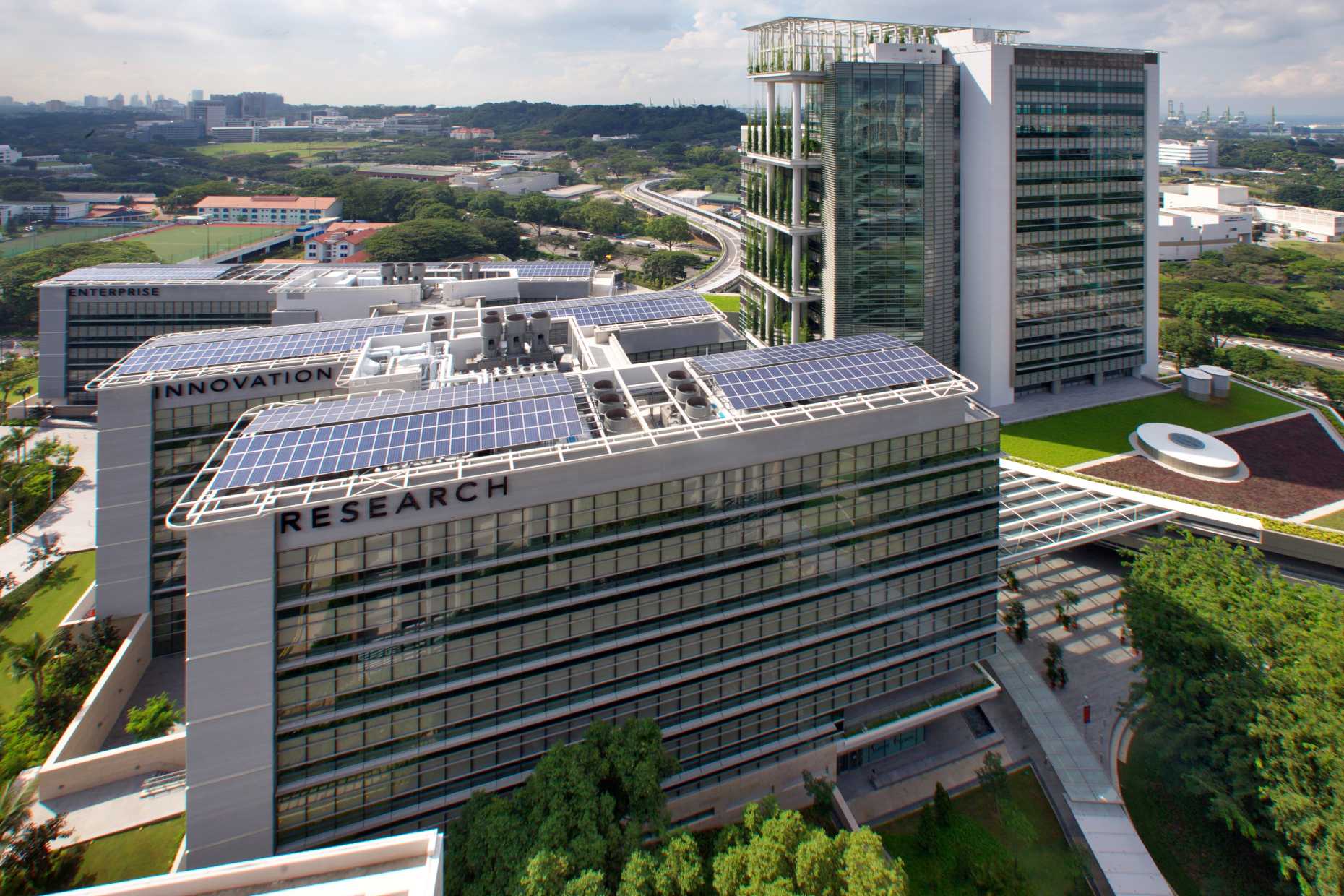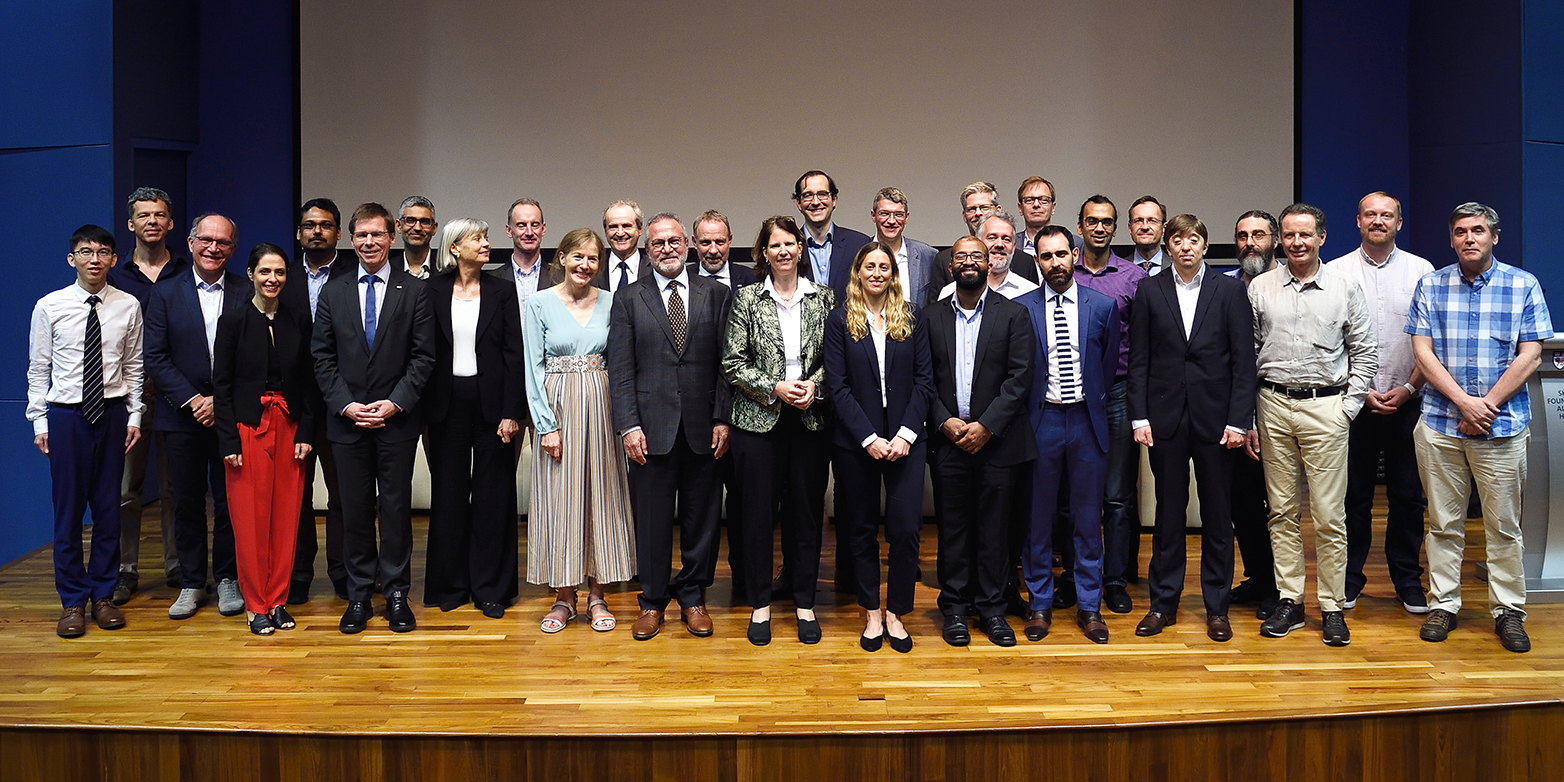Rethinking healthcare systems
ETH Zurich is planning to step up its research activities in Singapore. It aims to extend its current Future Resilient Systems programme by five years and to launch a new programme, Future Health Technologies, in the coming year.
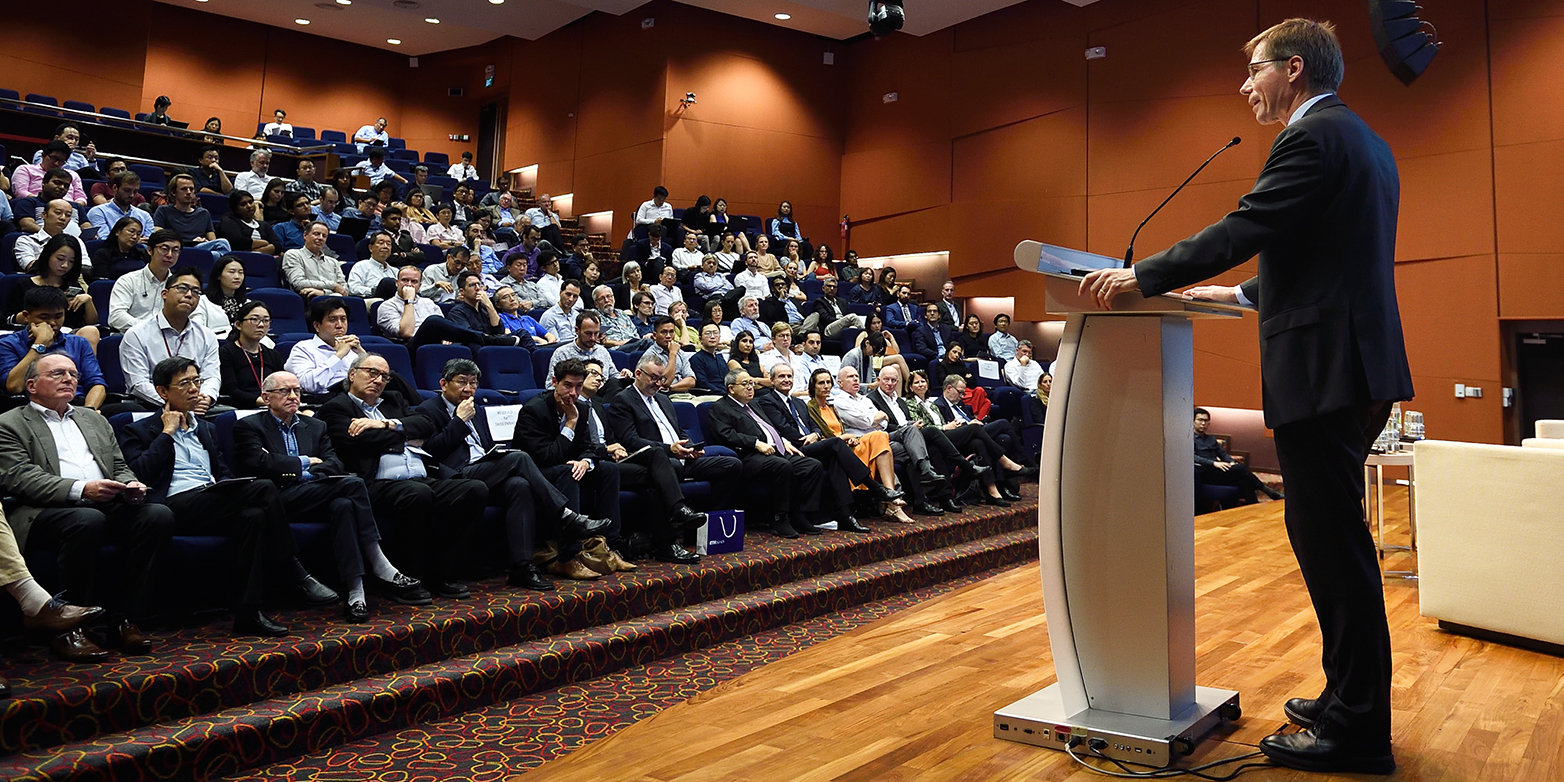
On Thursday, 5 December, ETH Zurich announced its future endeavours involving Singapore. Ahead of the CREATE Council meeting, ETH President Joël Mesot, ETH Vice President for Research and Corporate Relations Detlef Günther, and Director of the Singapore-ETH Centre (SEC) Gerhard Schmitt hosted an event where the programme directors presented their projects. One new research programme drew especial attention: Future Health Technologies, which ETH will launch in March 2020 in cooperation with Singapore’s National Research Foundation (NRF).
Answers for an ageing society
As the population in societies around the world grow older, new challenges are emerging. While Switzerland’s healthcare system still functions well today, other countries in Europe are already seeing clear signs of a decline in performance. These signs include, for example, when hospitals and clinics have difficulty staffing their facilities, or week-long waiting lists for scarce places in aftercare and rehabilitation centres. Such problems will become more acute over the coming years all over the world, including in Switzerland, as the ratio of over-60s in the population rapidly increases in the next few decades. Players in the healthcare system – hospitals, research and pharma as well as policymakers and the insurance industry – are under pressure to develop robust and sustainable alternatives.
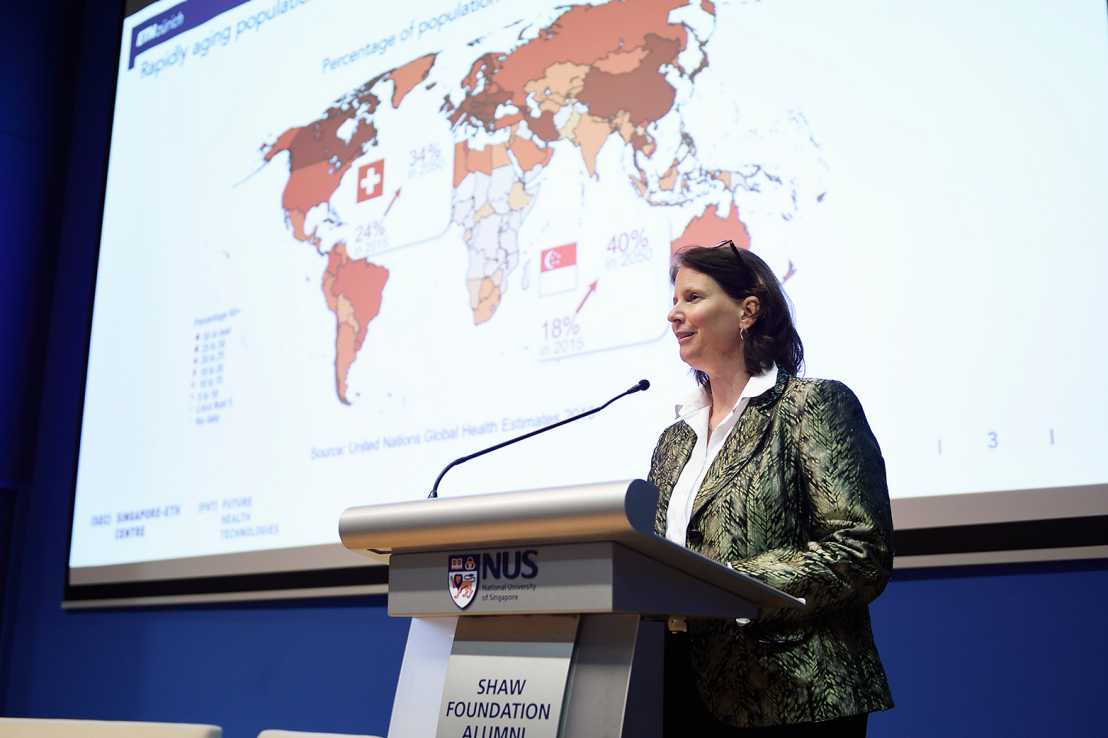
“Singapore saw the signs early on, and so we can learn a lot there,” says Nicole Wenderoth, Professor for Neural Control of Movement at ETH Zurich. She continues: “They have established an Office for Healthcare Transformation that has taken on this challenge.” She goes on to explain that in addition, Singapore is keen to address the question of return on investment in general – including when it comes to healthcare. As a result, the city-state offers a future-oriented environment highly suited for developing and testing efficient, practical solutions to this global challenge.
Wenderoth will serve as director of the new Future Health Technologies programme, which ETH Zurich plans to launch under the SEC umbrella in cooperation with partners from local universities, hospitals, and industry. The focus will be on how to deliver healthcare in innovative ways outside of hospitals and clinics. Specifically, the programme will be looking at new approaches in prevention and in supporting patients in rehabilitation after they have been discharged from hospital.
Future Health Technologies
ETH is kicking off the programme with three projects that all address topics of pressing interest to society, which can be addressed only through close cooperation between clinician scientists and researchers from Singapore and Zurich. “We don’t just want to know if, say, a particular sensor is functioning properly; we also want to define a process that highlights what is necessary for new technologies to truly improve health and well-being,” Wenderoth explains. This process should also identify which barriers stand in the way of an application and how these can be overcome. “In examining these issues, we will flesh out ethical standards and take regulatory concerns into account – two aspects that are essential in developing healthcare technologies to make them more efficient,” Wenderoth continues. She believes the resulting insights can then be adapted for Switzerland and other countries.
Preventing bone fractures
What might such a process look like? One possible answer lies in a project by Professors Bill Taylor and Stephen Ferguson from the Institute for Biomechanics at ETH Zurich and Professors Angelique Chan and David Matchar from the Duke-NUS Medical School in Singapore. Their work focuses on preventing hip fractures in older people.
Prevention projects aim to change the behaviour of individuals, but because this is very difficult to achieve, it is hard to get financing for broad-based preventive measures. But if it is possible to deliver preventive measures in a targeted way to people who are at a higher risk of falls and fractures, it is ultimately more cost-effective for the healthcare system. This is precisely the point of the project.
The ETH researchers have been conducting gait analyses for years. To help, they developed sensors that can be applied outside the lab to allow them to determine the probability of a person falling even outside of clinical supervision. Ben Helgason from Ferguson’s group developed a biomechanical model for this risk group. A simple scan of the hip joint makes it possible to predict if a fall would break any bones, and if so, which ones are likely to fracture. This means the scientists can identify people who are at risk of actually breaking a bone in a fall.
Here is where their clinical counterparts in Singapore come in: they offer the people in this high-risk group exercises for strengthening their muscles or teach them how to protect themselves should they fall.
“At the beginning we will have to study large cohorts,” Wenderoth says, “but ultimately we want to develop a phased model.” The plan is for older people to do the initial tests on a smartphone to evaluate their risk of falling. These results can aid in further analysis and so will be forwarded to geriatric specialists, who can then suggest targeted exercises and measures for people with an elevated risk.
Using chatbots to influence behaviour
ETH’s partners in Singapore are also playing a key role in the second project, which focusses on obesity – a condition that affects hundreds of millions of people worldwide. Given that obesity greatly increases the risk of diabetes, it’s necessary to teach the affected persons to change their eating habits – which is no easy task.
Led by Elgar Fleisch, Professor of Information Management, and Florian von Wangenheim, Professor of Technology Marketing, researchers at ETH Zurich have developed chatbots designed to help people adapt their lifestyles. The scientists have not only demonstrated that patients use their chatbots, but also that the chatbots can have a positive influence on the patients’ clinical parameters. But for such chatbots to be truly useful, their interactions need to take cultural factors into account. “The new programme in Singapore gives researchers the opportunity to develop such chatbots for Asia,” says Wenderoth. As a cultural melting pot, Singapore is well suited to this task.
Also involved in the project is Professor Tai E Shyong, an international obesity and diabetes expert who researches and teaches at the National University of Singapore and also works at the National University Hospital. “Our partners in Singapore are familiar with the different cultures there and are conducting a whole host of field studies in neighbourhoods that represent a range of economic and educational backgrounds. Access to a wide cross-section of society is especially important for a project of this nature,” Wenderoth says.
Improving the efficiency of rehabilitation
In the third project, Wenderoth and Roger Gassert, Professor of Rehabilitation Engineering, are teaming up with Professor Karen Chua from Tan Tock Seng Hospital and Professor Ang Wei Tech from Nanyang Technological University in Singapore to develop efficient therapy for stroke patients. One of their approaches is to offer treatment in rehabilitation centres and clinics that they tailor specifically to patients’ needs, working off of basic readings and measurements wherever possible. New training technology will also make it possible to offer outpatient treatment, meaning hospitals can discharge patients earlier. This way, they can undergo their usual rehabilitation exercises at home while still receiving remote support from their healthcare professional.
Final negotiations
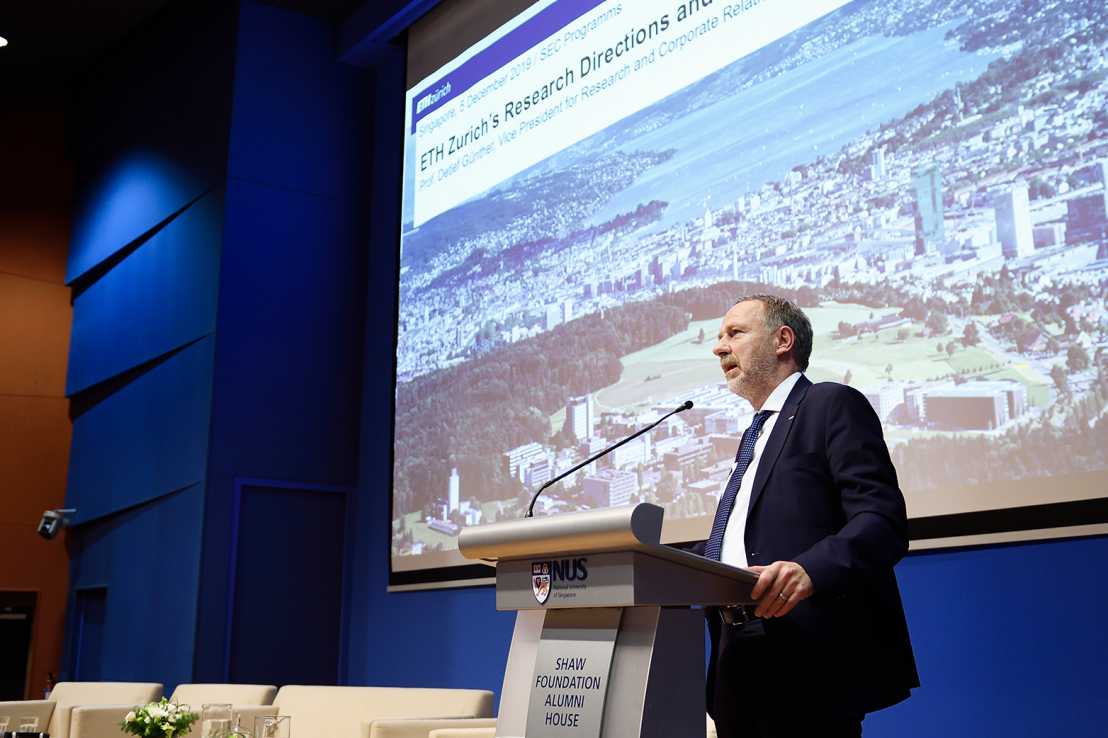
Before the researchers can start the project in March 2020, ETH Zurich and Singapore’s National Research Foundation (NRF) – the founders of the Singapore-ETH Centre (SEC) – need to work out the final details of the contract. The same applies to the second phase of the Future Resilient Systems programme, which started in 2014 and which first phase is now coming to an end. In this programme, researchers from Zurich collaborate with colleagues from universities in Singapore to address questions on the resilience of various infrastructure systems. They have already published more than 80 scientific studies to date.
Detlef Günther, ETH Vice President for Research and Corporate Relations and Co-Chair of the SEC Governing Board, is confident that the contracts will soon be signed. He emphasises that ETH Zurich’s commitment to the living lab, as Singapore describes itself, is strategically important not only for the university but for the whole of Switzerland. “There is a lot we can learn in and from Singapore. We can gain and bring back key experience and insights that we simply don’t have access to in Switzerland,” Günther says. In addition, the SEC offers an opportunity for doctoral students and postdoctoral researchers to contribute to and be part of a multicultural and interdisciplinary research cluster.
Singapore-ETH Centre (SEC)
The Singapore-ETH Centre for Global Environmental Sustainability (SEC) was established in 2010 by ETH Zurich in partnership with Singapore’s National Research Foundation (NRF). As ETH Zurich’s academic hub in Asia, it serves to bring researchers from universities, research institutions, industry and government agencies together in one place. The SEC provides the framework for individual five-year research programmes.
Launched in 2010, Future Cities Laboratory (FCL) was the first of these and in 2015 was extended for another five years (FCL 2). A further extension is not possible but in light of FCL’s huge success, ETH and the NRF are discussing the launch of a new programme under the working title of FCL Global, which could kick off in the second half of 2020.
Future Resilient Systems (FRS) was launched in 2014 and is now about to conclude. ETH and the NRF are currently negotiating the details of its successor (FRS 2).
The partners are also planning to launch a new programme, Future Health Technologies (FHT), in spring 2020. Contract negotiations for this one, too, are still ongoing to flesh out the details.
